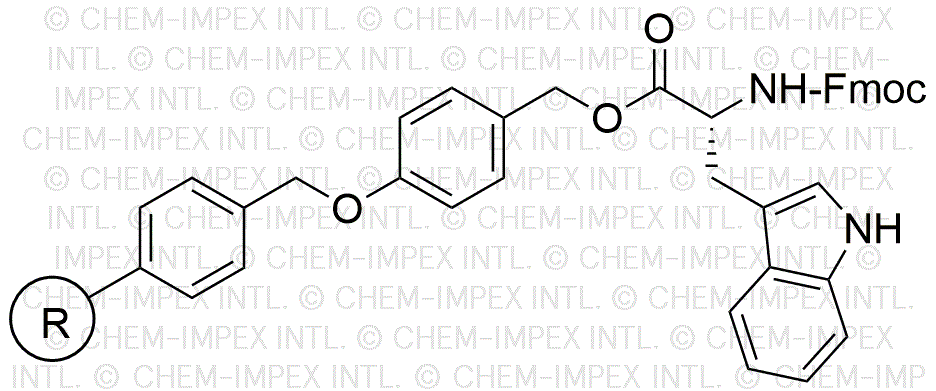Na-Fmoc-D-tryptophan 4-alkoxybenzyl alcohol resin is widely utilized in research focused on:
- Peptide Synthesis: This resin is essential in solid-phase peptide synthesis, allowing for the efficient assembly of peptides. Its properties facilitate the easy removal of protecting groups, streamlining the synthesis process.
- Drug Development: Researchers in pharmaceutical industries use this resin to create peptide-based drugs, particularly those targeting specific receptors. Its compatibility with various coupling reagents enhances the development of novel therapeutics.
- Bioconjugation: The resin is valuable in bioconjugation applications, where peptides are linked to other biomolecules. This is crucial for creating targeted drug delivery systems, improving therapeutic efficacy.
- Research in Neuroscience: Given the role of tryptophan in serotonin production, this resin is used in studies exploring neurochemical pathways, aiding in the development of treatments for mood disorders.
- Custom Peptide Libraries: This resin enables the creation of diverse peptide libraries for screening potential drug candidates, allowing researchers to identify promising compounds more efficiently.
Información general
Propiedades
Seguridad y normativas
Aplicaciones
Na-Fmoc-D-tryptophan 4-alkoxybenzyl alcohol resin is widely utilized in research focused on:
- Peptide Synthesis: This resin is essential in solid-phase peptide synthesis, allowing for the efficient assembly of peptides. Its properties facilitate the easy removal of protecting groups, streamlining the synthesis process.
- Drug Development: Researchers in pharmaceutical industries use this resin to create peptide-based drugs, particularly those targeting specific receptors. Its compatibility with various coupling reagents enhances the development of novel therapeutics.
- Bioconjugation: The resin is valuable in bioconjugation applications, where peptides are linked to other biomolecules. This is crucial for creating targeted drug delivery systems, improving therapeutic efficacy.
- Research in Neuroscience: Given the role of tryptophan in serotonin production, this resin is used in studies exploring neurochemical pathways, aiding in the development of treatments for mood disorders.
- Custom Peptide Libraries: This resin enables the creation of diverse peptide libraries for screening potential drug candidates, allowing researchers to identify promising compounds more efficiently.
Documentos
Hojas de datos de seguridad (HDS)
La SDS proporciona información de seguridad completa sobre la manipulación, el almacenamiento y la eliminación del producto.
Especificación del producto (PS)
La PS proporciona un desglose completo de las propiedades del producto, incluida la composición química, el estado físico, la pureza y los requisitos de almacenamiento. También detalla los rangos de calidad aceptables y las aplicaciones previstas del producto.
Certificados de análisis (COA)
Busque certificados de análisis (COA) ingresando el número de lote del producto. Los números de lote y de partida se pueden encontrar en la etiqueta de un producto después de las palabras "Lote" o "Lote".
Número de catálogo
Número de lote/lote
Certificados de origen (COO)
Este certificado de origen confirma el país en el que se fabricó el producto y también detalla los materiales y componentes utilizados en él y si se deriva de fuentes naturales, sintéticas u otras fuentes específicas. Este certificado puede ser necesario para cumplir con las normativas aduaneras, comerciales y regulatorias.
Número de catálogo
Número de lote/lote
Hojas de datos de seguridad (HDS)
La SDS proporciona información de seguridad completa sobre la manipulación, el almacenamiento y la eliminación del producto.
DownloadEspecificación del producto (PS)
La PS proporciona un desglose completo de las propiedades del producto, incluida la composición química, el estado físico, la pureza y los requisitos de almacenamiento. También detalla los rangos de calidad aceptables y las aplicaciones previstas del producto.
DownloadCertificados de análisis (COA)
Busque certificados de análisis (COA) ingresando el número de lote del producto. Los números de lote y de partida se pueden encontrar en la etiqueta de un producto después de las palabras "Lote" o "Lote".
Número de catálogo
Número de lote/lote
Certificados de origen (COO)
Este certificado de origen confirma el país en el que se fabricó el producto y también detalla los materiales y componentes utilizados en él y si se deriva de fuentes naturales, sintéticas u otras fuentes específicas. Este certificado puede ser necesario para cumplir con las normativas aduaneras, comerciales y regulatorias.

